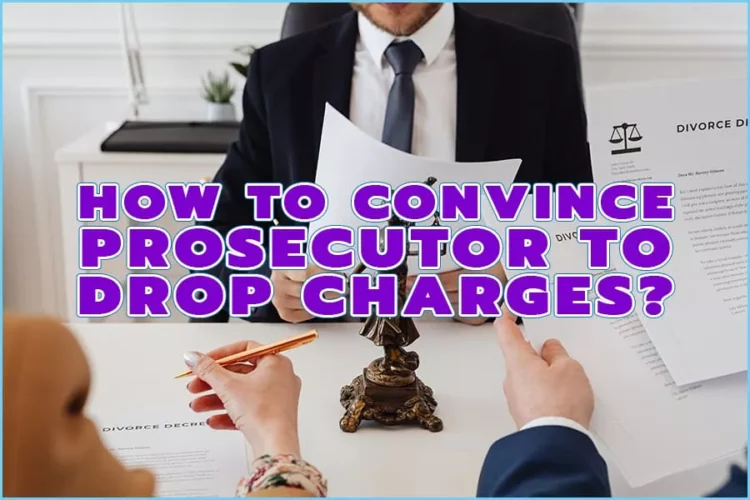If you are facing charges, then you might be experiencing various emotions. Generally, arrests are usually traumatic, but a criminal conviction will surely ruin your life.
Having a criminal record will prevent you from getting some jobs, owning a firearm, bank loan, etc.
Indeed, you might be worried about your future since you don’t know how the changes will impact your family. However, there are possibilities, though scary, that your charges can be reduced or dropped.
There are several reasons why a prosecutor might agree to drop the charges. The article has more information, but first, here’s the answer to the question.
How to Convince Prosecutor to Drop Charges?
There are various ways in which a criminal defendant can convince the prosecutor to dismiss charges. For instance, the defendant can accept to testify against another defendant.
Furthermore, weak or illegal evidence and a plea deal can lead to the dropping of charges. Plus, the defendant can also show that the police violated their rights. However, note that the prosecutor can still refile the case if they get new evidence.
Reasons Why A Prosecutor Might Choose To Drop Charges
Exculpatory Evidence
In simpler terms, exculpatory evidence is weak or illegal evidence. It is the primary reason why many prosecutors drop charges. Therefore, the evidence prevents the prosecutor from proving their case to a certain level.
Unfortunately, it doesn’t mean that the defendant isn’t guilty of the crime. But the court won’t be able to prove that the accused committed the crime beyond a reasonable doubt. Here are some of the examples of exculpatory evidence:
- Another person who’s not the defendant confesses to the crime.
- There’s proof that the defendant wasn’t at the scene when the crime happened.
- The crime’s footage shows someone else who’s not the defendant committing the crime.
The prosecutor will have to drop the charges whenever the exculpatory evidence is so strong. Since it means the defendant did not commit the alleged crime.
However, some prosecutors only drop the charges when the exculpatory evidence is overwhelmingly strong. It is common for law enforcement doesn’t have any other suspects.
Willingness To Cooperate
The prosecutor can agree to drop charges if the defendant cooperates in their other case. However, this option is only available in very limited circumstances. Firstly the defendant’s offense needs to be relatively minor.
Secondly, the defendant needs to have enough evidence or information about the other person. Thirdly, the other case needs to be so important than what the defendant is having.
Even though this option is possible most law enforcement aren’t always willing to drop the charges fully.
Instead, they offer the defendant a lighter sentence or a better plea deal. However, you should note that cooperating with law enforcement to flip someone else is quite risky. Always seek legal advice from a criminal defense attorney before making any deal.
Inadequate Resources
District attorneys and prosecutors usually have too many cases than they can efficiently handle. As a result, this forces them to allocate resources and time to the most important cases. Therefore they end up dismissing or dropping minor charges.
The prosecutor is more likely to dismiss your case if the crime is minor. Alternatively, they’ll also drop it if you do not have a criminal record.
Clerical Or Procedural Errors
Clerical errors include mistakes and can lead to charge dismissal. The mistakes can appear in the name, height, age, place of crime and residence, etc.
For this reason, all the crucial information about a specific defendant must be correct. The complaint should not have name misspellings, wrong place of crime and residence, etc.
The court will dismiss any complaint with errors. However, the prosecutor can still refile the charges.
On the brighter side, the dismissal gives the defense counsel some time. Therefore they can gather exculpatory evidence or negotiate a plea bargain.
Plus, they can convince the prosecutor not to refile the complaint. On the contrary, most prosecutors do not dismiss serious charges.
If the charges are minor and not worth their time, then the chances of dismissing them are high. If you have an experienced defense attorney, they can help negotiate for dismissal.
Additionally, they can push for a probationary program, which you’ll have to complete for your charges to drop.
Fourth Amendment Violation
The fourth amendment offers protection to citizens. It’s against unlawful seizures and searches by police, investigators, etc.
Therefore its violation by law enforcers will lead to an automatic drop of charges. If there’s any evidence of police violation, it becomes subject to the exclusionary rule.
The defendant’s lawyer will have the power to prevent the evidence from being used in the trial. Therefore the prosecutor will have insufficient evidence to win a conviction. Their only option will be to drop the charges.
According to the U.S constitution, criminal suspects also have rights. Some of their rights that people commonly violate include 4th, 5th, and 6th amendment rights.
Note that it’s up to the defendant to show that a constitutional violation did happen. However, without the help of a good defense attorney, this can be quite tricky.
Plea Bargain
There are different types of pleas bargains. In some, the prosecutor can drop one or several charges.
The most popular type of plea bargain is the count bargain. Under this plea bargain, a defendant with multiple charges accepts to count a plea bargain.
Meaning the defendant will have to plead guilty to one or more charges. In exchange, the prosecutor will dismiss other charges.
What Is Reducing A Charge?
You might be wondering whether it’s possible to reduce a charge. It’s possible and happens when the evidence isn’t strong for a major charge but applies to a lesser charge. In this case, the prosecutor will offer a “plea bargain agreement.”
The prosecutor then agreed to drop the original charge. But it only happens if the defendant accepts to plead guilty to a lesser charge.
Several attorneys will guide you in protecting your legal rights during the agreement. Therefore always seek an attorney’s advice before making any decision.
Plus, it’s advisable not to accept the agreement if the original case charge is weak. There’s a chance that the court will not delete the original case from the records. It will still happen even after making a plea bargain agreement.
Consequently, you can face the original charge and not get a conviction if the case is weak. Meaning the case might not appear on your criminal record.
Frequently Asked Questions (FAQs)
Can charges be dropped before trial?
Yes, the prosecutor can drop charges before the trial starts. You need to know that most criminal cases don’t get to trial. Plus, many cases end up with a dismissal or plea bargain. Court judges can also summarily dispose of some cases, a popular traffic citation outcome.
What is the difference between dismissal and plea bargain?
The effects of a plea bargain are similar to that of being found guilty in a trial. If you accept a plea of “no contest” or “guilty,” the court records will show that you faced conviction. Sadly, the court judge will sentence you. However, you will avoid all these consequences when it comes to dismissal.
Can a criminal attorney help one get charges dismissed?
Yes, the criminal defense attorney evaluates the case and evidence to determine whether it can file a dismissal motion. Note that there are several grounds for charge dismissal.
What happens when the prosecutor drops charges?
If the prosecutor drops charges, it means you have no case. However, dropping a charge doesn’t mean you aren’t guilty. It ends the current case, and the court won’t acquit or convict you. However, a criminal background check will show the arrest.
What is grand jury dismissal?
It happens when the grand jury convenes to consider a charge indictment. If it decides that the case is not strong enough, it will dismiss it, or the prosecutor can do that. But most times, the prosecutors prefer dismissing the case. It helps them avoid wasting time prosecuting a case they can’t win.
What is the difference between case dropping and dismissal?
Dropping and dismissing a case is similar in some ways. It’s because, in the end, the defendant will be free.
However, dismissal only happens after charge filling, while a charge dropping happens before and after charge filling. The court will dismiss a charge if the prosecutor has made a significant legal error.
Conclusion
If you’ve been wondering how to convince prosecutor to drop charges, you are now well equipped with the knowledge. There are several reasons that make a prosecutor drop charges. However, it’s not that easy for them to do this. It means you need an effective lawyer to have your charges dropped.
There are instances when a prosecutor can voluntarily dismiss charges. However, they need serious negotiation and persuasion before they file a dismissal. Plus, your lawyer has the power to file a motion that requests the judge to drop charges.
Most judges refer to the prosecutor and don’t drop cases by themselves. But if the circumstances are perfect, the judge will have no other option but to drop the charges.










